I want to render a 'card' with certain details pulled from a MongoDB database, and passed in as props to a React front-end. The back-end is a serverless function.
Currently, I can't get my React code to find my MongoDB entries. It keeps timing out with the below error message:
2020-10-12T15:25:11.119Z cde99f57-0da2-4b71-9fc1-d2eda3c1369c ERROR (node:8) DeprecationWarning: current Server Discovery and Monitoring engine is deprecated, and will be removed in a future version. To use the new Server Discover and Monitoring engine, pass option { useUnifiedTopology: true } to the MongoClient constructor.
2020-10-12T15:25:21.062Z cde99f57-0da2-4b71-9fc1-d2eda3c1369c Task timed out after 10.01 seconds
This happens after every single reload of the page - the request keeps timing out.
Can anyone point out what I'm doing wrong here?
Here's my code...
Schema:
const mongoose = require("mongoose");
const Schema = mongoose.Schema;
const SubmitDebtSchema = new Schema ({
creditCard: String,
personalLoan: String,
provider: String,
balance: Number,
limit: Number,
monthly: Number,
interest: Number,
borrowed: Number
});
module.exports = mongoose.model('submitdebts', SubmitDebtSchema);
My 'fetch' API function:
const express = require("express");
const mongoose = require("mongoose");
const bodyParser = require("body-parser");
const SubmitDebt = require("./submitDebtSchema");
require("dotenv").config();
const app = express();
app.use(bodyParser.urlencoded({
extended: true
}));
mongoose.connect(`mongodb+srv://${process.env.MONGO_USER}:${process.env.MONGO_PASSWORD}@otter-money.f9twk.mongodb.net/test?retryWrites=true&w=majority`, {useNewUrlParser: true, useUnifiedTopology: true});
module.exports = async (req, res) => {
res.statusCode = 200;
res.setHeader("Content-Type", "application/json");
await SubmitDebt.find({});
};
My React code:
class IndividualDebts extends Component {
constructor(props) {
super(props)
this.state = {
debts: {}
}
this.getDebtCards = this.getDebtCards.bind(this);
this.renderDebtCards = this.renderDebtCards.bind(this);
}
componentDidMount = () => {
this.getDebtCards()
}
getDebtCards = () => {
axios.get("/api/fetchDebtCards")
.then((res) => {
const data = res.data
this.setState ({
debts: data
})
console.log("Data has been received.")
})
.catch((error) => {
alert("Error fetching the data.")
console.log(error)
})
}
renderDebtCards = (debts) => {
if (!this.state.debts.length) {
return null
}
this.state.debts.map((debt, index) => {
return (
<div>
<IndividualDebtCard key={index}
provider={debt.provider}
type={debt.creditCard === 'true' ? debt.creditCard : "Personal Loan" }
balance={debt.balance}
limit={debt.creditCard === 'true' ? debt.limit : debt.borrowed}
monthly={debt.monthly}
interest={debt.interest} />
</div>
)
})
}
render() {
return (
<div>
<section className="individual-debts-section">
<div className="individual-debts-container">
<div className="individual-debts-heading">
<h3>Individual Breakdown</h3>
</div>
<div className="individual-debts-card-container">
{this.renderDebtCards()}
</div>
I feel like it's really close, but I just can't figure out what I'm doing wrong!! Any tips?
Thank you
